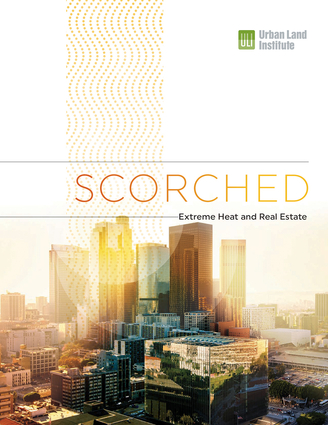Overview
Extreme heat is the most widespread and deadly weather-related hazard in the United States, and it is worsening due to both climate change and urban development patterns. It is a complex problem that has significant impacts on human health, and the built environment offers numerous opportunities for mitigation.Scorched: Extreme Heat and Real Estate outlines how extreme heat will affect the real estate and land use sectors and highlights the leadership and the potential positive impact of the real estate sector in implementing “heat-resilient” building designs and land uses. The report provides an overview of extreme heat’s connections to the built environment and an in-depth discussion of heat mitigation and adaptation strategies related to building design, building materials, green infrastructure and public space design. These strategies can “future-proof” real estate in vulnerable markets; lower operations and management costs; improve tenant and occupant experience; and otherwise differentiate a real estate project.Through a series of real estate development and land use policy case studies, the report explores how U.S. real estate developers, designers, and policymakers are implementing solutions to make spaces more adaptable to environmental conditions and comfortable for occupants.Author Biography
Katharine Burgess is Vice President of the Urban Land Institute’s Urban Resilience Program. Through research, advisory services, convenings and outreach, ULI’s Urban Resilience program works to leverage ULI’s global network to help communities prepare for increased climate risk and make wise investments in infrastructure, development and building design. The program addresses topics including land-use planning, financing models, green infrastructure solutions, preparedness and the support of social and economic networks.An urban planner with 12 years’ experience, Katharine has practiced urban planning in the United States, the United Kingdom, and Germany, with global project work across the United States, Europe, and Asia. She began her career managing post-Katrina hurricane recovery charrettes commissioned by the states of Louisiana and Mississippi and the city of New Orleans. She has since worked on a range of large-scale, mixed-use master planning initiatives designed to encourage pedestrian activity and integrate green infrastructure, including campus plans, downtown revitalization plans, urban extensions and a new town for 10,000 people in Scotland. Katharine’s research work has included landscape performance research for the Landscape Architecture Foundation, as well as international urban development research for the Robert Bosch Foundation Fellowship program, during which she completed a work placement at the City of Berlin’s Department for Urban Development. She received a BA from Williams College and an MSc in Regional and Urban Planning from the London School of Economics. Elizabeth Foster is a Senior Associate for the Urban Resilience program. She conducts research and collaborates with ULI staff and members to provide knowledge and share innovative practices that help communities prepare for and adapt to climate risks. Elizabeth is currently investigating how extreme heat impacts real estate and land use. She is also partnering with ULI’s Building Healthy Places program/the 10-Minute Walk campaign to explore the connections between resilience, parks, and open spaces.Before coming to ULI, Elizabeth focused on disaster management and climate change adaptation in the private sector with a multinational insurance company and then internationally with U.S. Peace Corps Response. Elizabeth began her career developing the sustainability plan for her alma mater and expanding environmental education at an urban greening/youth empowerment nonprofit in St. Paul, MN. Passionate about equitable sustainable development, Elizabeth has also helped administer a joint UNEP/ELI class on environmental security and sustaining peace.Elizabeth received a B.A. in Environmental Studies from Macalester College (St. Paul, MN) and a Certificate in Emergency Management from Drexel University (Philadelphia, PA).


